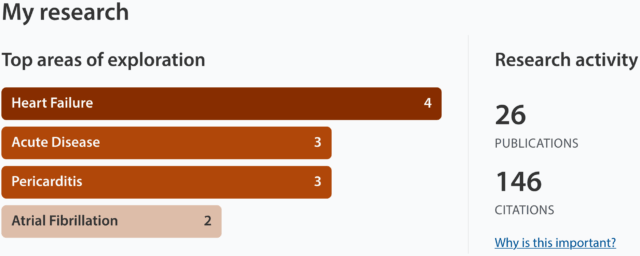Publications and Citations
-
Why are they important?
On our provider profiles, you'll see a summary of their research work, including their publications, citations. Learn how this can help you in finding a doctor that's right for you.

Top areas of exploration
This graph shows you at a glance what the key areas of study the provider has focused on in their career.
Publications
At a glance, you can see how many times a provider has been published in an academic journal. These publications can include:
- Results of clinical research studies that the physician rook part in. They might have been the lead author of the article or part of a team of researchers and clinicians that investigated the subject
- Letters and review articles, where the summarized or reviewed the field of study around a subject
- Case studies involving specific patients and treatments
A large number of publications can indicate the depth of knowledge the provider has into a condition or disease and how to treat that disease.
Citations
A citation is a reference to a source. It indicates that a publication that has been written by an author has appeared in another research paper or scientific article. A citation can either appear in the body of a written work or in the list of referenced sources at the end of the work (the bibliography).
Citations indicate how much impact a researcher's work has had on a field of study or research. It demonstrates how that work has influenced further study or has informed the standards of practice. High numbers of citations generally indicate that an author's papers have been published in journals with a large audience.
It is important to note that some fields of study and research are very narrow. If a researcher had a small number of citations, that can be due to the small number of researchers that study that particular medical condition - for instance, a rare disease.
Service to the profession
Writing research articles is only one way in which our providers contribute to science. Some serve on committees that determine what studies are funded. Others focus on interpreting the data from these studies on local, regional and national scales. To get a complete picture of their expertise, take the time to review their full research and service areas on their profile.
